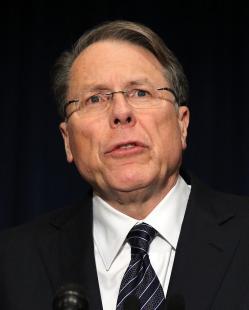Read more in Slate about gun control.
The National Rifle Association says it’s tough on crime. It wants to “keep guns out of the hands of people who are potential killers,” according to NRA president David Keene. Yesterday, after President Obama issued a list of gun-control proposals in response to the Sandy Hook massacre, the NRA charged that under Obama’s plan, “Only honest, law-abiding gun owners will be affected.” The better course, said the organization, was “prosecuting violent criminals to the fullest extent of the law.”
But the NRA doesn’t help the government prosecute accused criminals. It defends them. The NRA is a civil liberties organization, like the ACLU. It focuses not on protecting the public, but on the rights of those who are arrested, accused, or prosecuted. Except that the NRA, unlike the ACLU, doesn’t concern itself with the rights of suspects in general. It focuses entirely on preserving their access to guns.
In 2009, Rep. Peter King, R-N.Y., and Sen. Frank Lautenberg, D-N.J., introduced the Denying Firearms and Explosives to Dangerous Terrorists Act. The bill would have given the U.S. attorney general authority to block weapons sales to anyone on the government’s terrorist watch list. Supporters of the legislation noted that in the preceding five years, people on the list had tried to buy firearms at least 963 times, with an 89 percent success rate. They reasoned that it made no sense to pull such people aside as they were boarding airplanes but to look the other way when they purchased guns. Under the bill, anyone barred from buying a weapon could challenge the government’s determination of his ineligibility.
The NRA opposed the bill, claiming it would “deny law-abiding people due process and their Second Amendment rights.” As evidence, the NRA’s chief lobbyist cited a Justice Department report indicating that 6 percent of people on the list were included based on obsolete or extraneous FBI information. An editorial published by the NRA complained that the bill would lower “the standard measure of proof of guilt in criminal prosecutions” and that “whole segments of lawful firearms commerce could be wiped out.” The bill died in committee.
That same year, Maryland lawmakers introduced a bill that would give judges authority, when issuing protective orders against potential domestic violence, to “order the respondent to surrender to law enforcement authorities any firearm in the respondent’s possession, and to refrain from possession of any firearm, for the duration of the temporary protective order.” Under the bill, this restriction couldn’t apply for more than a week. Nevertheless, the NRA called the legislation “unnecessary and unfair,” arguing that it would render “a victim of false allegations” unable to “defend himself at home or simply possess his own guns for any other lawful purpose.”
In March 2011, Sen. Chuck Schumer, D-N.Y., introduced the Fix Gun Checks Act. The NRA blasted the bill, protesting that it would “expand the range of persons prohibited from owning firearms” and “eliminate private sales and gun shows as we know them.” The NRA saluted one of its members, law professor Dave Kopel, for pointing out in a hearing that the bill “would deprive gun owners of their rights” by including, among the grounds for rejecting a gun sale, the buyer’s “arrest for the use or possession of a controlled substance within the past 5 years.”
In August 2012, the Department of Justice issued a rule allowing the Bureau of Alcohol, Tobacco, Firearms, and Explosives “to seize and administratively forfeit property involved in controlled substance offenses.” The rule was limited to “a trial period of one year,” but that didn’t stop the NRA from attacking it. A commentary reprinted by the NRA called the rule “gun-grabbing,” accused “law enforcement agencies” of using forfeiture to make money, and protested that “such seizures are common in drug cases, which sometimes can ensnare people who have done nothing wrong.”
Now the NRA says it’s a friend of law enforcement and an enemy of thugs and crooks. “I’ll tell you what would work right now,” says NRA CEO Wayne LaPierre. “Tomorrow morning—and the NRA would be there every step of the way—if President Obama would walk in and tell the attorney general of the United States to tell every U.S. attorney, ‘If you catch a drug dealer on the street with a gun, I want you to prosecute him.’ ”
Drop the act, Wayne. You’re not fighting to protect us from accused drug dealers, wife beaters, and terrorists. You’re their lawyer.
Thanks to Daniel Block for research assistance.
William Saletan’s latest short takes on the news, via Twitter:
